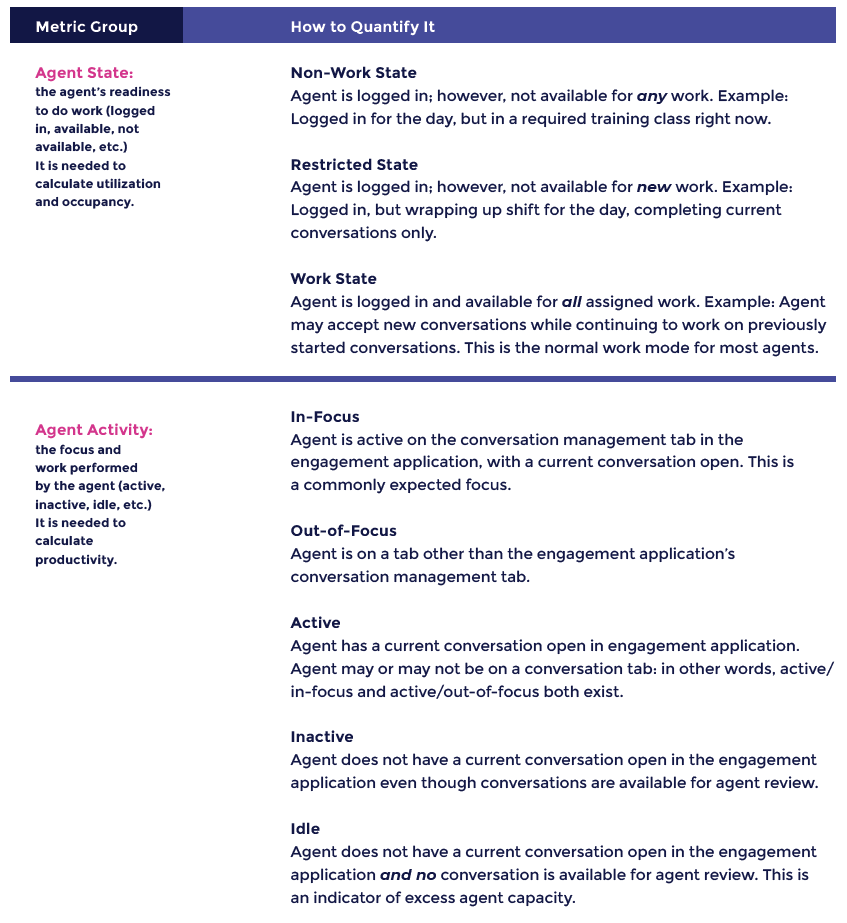 Logo
Logo
EXPERT INSIGHTS
Nov-07-2019
Customer Service Metrics That Matter
Phil Garbrecht
When your brand understands how well your digital customer service team is performing, and how happy your customers are with their service, you can work strategically to improve the digital customer care your brand offers. This is great news, but the better news is you don’t have to guess: There are customer service metrics that brands from every industry can use to improve their customer support and, by extension, the customer experience as a whole. Below we explore important customer-focused and agent-focus metrics, how to measure them, and why they’re important.
Customer-focused metrics
Two of the most crucial customer-focused metrics are CSAT (customer satisfaction) and NPS (net promoter score). Both metrics offer an elegant solution to determine how well your brand is meeting customer needs and expectations by simply asking the customer. Digital customers today know what they want and know what they expect from brands, so they’re equipped to accurately report on their experience with your brand. Khoros offers the ability to initiate surveys on Twitter following a service interaction, allowing you to gain a fuller view of customer feedback, and quickly collect CSAT and NPS data.
CSAT data: what your customers really think
CSAT data can shed an unvarnished light on your brand’s resolution rate. With CSAT data you’ll know whether or not your brand is providing resolutions at the level and quality you want.
NPS data: a holistic view
Your brand’s NPS data can be used to determine your customers’ loyalty. NPS data can illuminate how a customer’s experience with an agent impacts their overall view of the brand. This data can offer your brand insight about both the customer experience and your agents’ performance.
These two customer service metrics offer your brand valuable insights, but you can also gain perspective by asking your customers directly for feedback through real-time surveys on Twitter or in your own user community. For more details, see our Digital Customer Care Playbook.
Customer retention rate
While this metric doesn't have a fancy acronym, it is by far the most important customer-focused metric to know and track. Studies show it costs five times more to attract a new customer than it does to retain an existing one. Increasing retention by just five percent increases profits anywhere from 25 to 95 percent. If your business is struggling to retain customers, it could be due to gaps in the customer experience. Unify your departments within a single engagement platform to ensure everyone's efforts are laddering up to happy customers.
Team-focused metrics
It can be difficult to keep tabs on how your brand’s digital care agents spend their time, as agents don’t usually do just one thing at a time. Often, agents are speaking to multiple customers on multiple channels, simultaneously. But, even though it’s complicated, getting a handle on your team’s customer service metrics is not only possible, it’s vital to the health of your brand’s digital customer support program. To take a deep dive on the subject, read our ebook Modernizing Your Contact Center.
The key to effective workforce management is understanding not only what an agent has done — the number of responses sent in the prior hour, for example — but also what their present state of readiness for work is and the work in which the agent is currently engaged. Khoros Care provides the real-time metrics associated with agent activity and productivity.
In the following table, Khoros offers key insights and metrics needed to understand agent activity in a way that supports operationalizing customer care when it comes to phone and contact center care, as well as planned, dynamic workforce management. The following metrics; Agent availability, agent state, agent time, and handle time; are vital for your brand to track. This ensures consistent, excellent customer experiences without exceeding your budget.

The metrics above are useful, but there’s more that you can do: Take a look at the chart below, showing an enterprise-class social customer team as it operates throughout the day. The chart shows agent capacity and utilization, in minutes, as it varies through the day.

The chart includes active time in conversation management (in-focus active time), active time spent spent researching customer issues (out-of-focus active time). Totaled together, this indicates the total conversation handle time and provides a stable, comparative measure of agent utilization. For the team shown, it is 70 - 75 percent of logged-in time.
In addition to the time directly related to conversation handling, the charts also show two additional and highly useful time groupings:
- The light blue bar shows in-focus inactive time (meaning, the agent is on the response tab), idle time, and the purple bar shows non-agent-mode time. Looking at the chart, the largest segment is idle time, and it is most prominent earlier in the day. When you’re able to measure idle time, you can reduce it and improve your team’s efficiency.
- The mauve segments indicate out-of-focus time: for this measured time collection, the most prevalent is out-of-focus, inactive time. This means no work is being done even though there are conversations available, as opposed to idle time, where agents have actually run out of work, which you can also see. Because you can identify and measure this, you can take action as necessary.
While the metrics shown are specific to Khoros Care, you can adapt the concepts and incorporate similar metrics in other enterprise-grade engagement platforms. The model itself is applicable to any platform and engagement team planning on that platform, subject only to actual data availability.
How Khoros Can Help
In addition to offering the ability to conduct staple surveys like CSAT and NPS, the Khoros Care platform provides more than fifty workflow and agent state metrics which are all collected in five-minute intervals and presented in real-time in ten minute increments.
To learn more about the Khoros Care unified digital engagement platform and how you can operationalize your digital care team, check out our latest eBook, Modernizing Your Contact Center.











